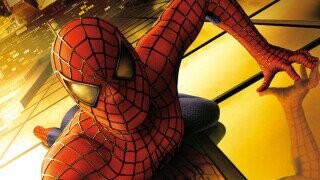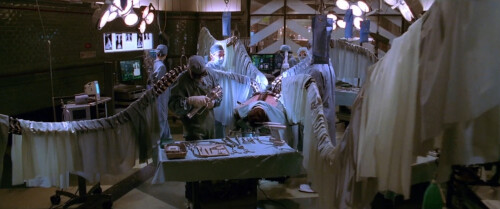How Sam Raimi's 'Spider-Man' Changed Everything

After a long wait, Spider-Man: No Way Home is finally swinging into theaters. To celebrate, Cracked is doing a deep dive into the pop-culture web that our friendly neighborhood wall-crawler has spun for almost six decades.
We're also giving away a year-long subscription to Marvel Unlimited. Learn more here, or add your email below to enter.
Don't Miss
Even though most of us have watched poor Uncle Ben suffer Sean Bean-levels of onscreen deaths by this point, we're all still excited about a new Spider-Man movie. Typically the story of a minor getting bit by a genetically-altered arachnid would end in a trip to the hospital, but in the world of comics, it launched pop mythology rich enough to spawn multiple film franchises. The first being Sam Raimi's occasionally frustrating, often brilliant trilogy that undoubtedly paved the way for the multibillion-dollar trend of 21st-century superhero movies.
It's no secret that a big reason why fans are so excited about the upcoming Spider-Man: No Way Home is the (more than likely) return of the original cinematic Spidey, Tobey Maguire, in a not-so-secret interdimensional curtain call. Yup, a 46-year-old Maguire is returning to the role of Peter Parker – who, we hope to God, isn't supposed to be a scrappy young 21-year-old anymore.
And Maguire isn't the only remnant of the Raimi trilogy making the jump to the MCU. There's also Sandman, Doctor Octopus, The Green Goblin, and, of course, J.K. Simmons' J. Jonah Jameson – although anyone holding their breath for a cameo from Topher Grace's wisecracking Venom should probably head to a movie theater where the ushers all know CPR.
The palpable enthusiasm for this particular corner of the Spider-verse makes total sense; when it hit theatres in 2002, Raimi's Spider-Man was something of a revelation for movie-goers and a pop-cultural triumph for disheartened comic fans. Following the blockbuster success of Tim Burton's Batman films, the '90s superhero movie trend was a mostly dismal slog. There was the occasional gem such as Blade or Mystery Men, but mostly we got movies like The Shadow starring Alec Baldwin and his goofy rubber nose, or Spawn featuring an unconvincing CGI Devil (that unintentionally was an affront to God). In 1997, going to see a new DC Comic superhero movie meant either watching Batman & Robin or subjecting yourself to this bargain-basement insanity.
The character of Spider-Man, meanwhile, had been embroiled in decades of behind-the-scenes quagmires preventing everybody's favorite web-slinger from reaching the big screen, all of which made his delayed appearance that much more cathartic when it finally came to fruition. As far back as 1976, there were plans to make a Spider-Man movie, albeit a musical version featuring "100-foot robots and Nazis." Then, in the early '80s, there was a pitch from B-movie legend Roger Corman about how Spidey prevents a nuclear war with Russia and contends with "sexy KGB agents."
Eventually, the rights were purchased by Cannon Films, the lovably sketchy studio behind '80s disasters such as Masters of the Universe, Superman IV: The Quest for Peace, and of course, Breakin' 2: Electric Boogaloo. Cannon nabbed Spider-Man for just $225,000 and immediately commissioned a script in which Peter Parker turns into an "eight-legged human-tarantula hybrid" after being experimented on by his boss, the evil Dr. Zyrex. Wait, what?
The script went through various rewrites, eventually becoming closer to the less-monstrous version of the character we're all familiar with. And despite the fact that Cannon didn't actually have a finished film, or even an unfinished one, that didn't stop them from promoting the hell out of Spider-Man: The Movie, even releasing a teaser trailer for their hypothetical blockbuster.
Cannon's financial troubles eventually torpedoed the project, but the studio's notorious co-owner Menahem Golan retained the rights even after he was forced out of the company. In the early '90s, he took the project over to Carolco Pictures, makers of Total Recall and The Terminator, who hired James Cameron (yes, that James Cameron) to come up with a new story.
Cameron's take, a 57-page "scriptment," is ... different, to say the least. For one thing, Cameron cranks the sexual innuendo up to 11. Instead of mechanical web-shooters, in Cameron's version, Spidey's webbing organically spews from his wrists, a deviation from the comics that somehow survived all the way to Raimi's film. That way, we get a scene where Peter discovers his newfound power thanks to a gooey nocturnal emission. You didn't expect subtlety from the True Lies guy, did you?

Sony
Cameron's script was clearly playing to an adult audience, featuring F-bombs and even a sex scene between Spider-Man and Mary Jane in which he "playfully ties her down with webbing." Thankfully, we were all spared this experience once Cameron tried to scrap Golan's producer credit, prompting a lawsuit that resulted in a nearly-decade-long legal imbroglio. When the dust finally settled, Sony ended up with the rights to the movie and hired Jurassic Park screenwriter David Koepp to drastically rewrite Cameron's draft. Then they handed the keys to their $140 million movie over to the Evil Dead guy, and the rest is history.
It's hard to talk about the experience of first seeing Spider-Man back in 2002 without considering the context of 9/11. Not just because it's a distinctly New York story, but also the very first glimpse of the film, for many of us, was the soon-to-be-banned teaser trailer which found Spider-Man ensnaring a helicopter full of bank robbers in a giant web strung between the twin towers.
When the movie actually came out, it seemingly had been slightly modified to pointedly, but also intentionally vaguely, address current events. Most memorably, in an addition to the film's climax filmed in the wake of 9/11, a random assortment of New Yorkers take on The Green Goblin as he's battling Spider-Man, shouting: "You mess with one of us, you mess with all of us."
The immediacy of the story's random pivot to urban American unity from apolitical pulp adventure sets Spider-Man apart from the many subsequent superhero movies that similarly reacted to 9/11 but did so in dark, brooding terror-based allegories. Raimi's approach didn't just appeal to audiences in that specific movement; it arguably laid the groundwork for the Marvel Cinematic Universe's lucrative formula, balancing genuine dramatic stakes with lighthearted goofballery. But looking back at Spider-Man, it still owes much to the superhero movies that had come before, namely Burton's Batman – from the booming Danny Elfman score to the casting of Willem Dafoe, once considered to play the Joker, as the villain. Not to mention how both Joker and Green Goblin have a penchant for staging violent attacks during parades.

Warner Bros.

Sony
But Raimi's first two Spider-Man movies take even more inspiration from another superhero movie; Raimi's own, extremely underrated, Darkman. There are subtle shades of Darkman in the first Spider-Man, but it's more apparent in Spider-Man 2. While the first movie wowed audiences, the sequel somehow surpassed even our inflated expectations. Part of the reason why it works so well is that Raimi basically transposed the tragic hero story of Darkman onto the character of Doctor Octopus. Both Peyton Westlake and Otto Octavius are scientific geniuses working out of loft apartments, but after their swank digs blow up, each scientist is transformed into a grotesque new identity (Darkman and Doc Ock, respectively) and have to escape the confines of a hospital run by callous doctors.

Universal Pictures

Sony
They then continue their work in abandoned industrial spaces like a couple of evil genius Spirit Halloweens.

Universal Pictures

Sony
In retrospect, it's amazing how plotless Raimi's first two movies are. Spider-Man is just a series of character moments strung together with little to no overarching narrative. Even The Green Goblin doesn't have any kind of master plan beyond simply self-preservation and madness. The connective tissue of the story is purely emotional; ultimately, Spider-Man is about Peter's journey towards accepting that Uncle Ben was his father while rejecting the corrupt paternal influence of Norman Osborn. Similarly, what drives Spider-Man 2 is a nuanced moral that resonates more the older you get: sometimes you have to give up on your dreams. Peter has to sacrifice much of his life's ambition in order to continue being Spider-Man, while Doc Ock ultimately realizes that he needs to destroy his life's work that has caused so much collateral damage.
Then came Spider-Man 3, which largely followed the formula of its predecessors but was crammed full of unnecessary villains and even more unnecessary dance numbers. The movie was already overstuffed before the addition of young, frosted-tipped hair Venom, which the studio insisted on purely to appeal to the kids – basically the superhero equivalent of that Steve Buscemi skateboard meme. Venom's inclusion also required staging a truncated version of the "Alien Costume Saga" comic arc that unfortunately played out on film like an emo version of The Mask starring Garth Brooks' alter-ego Chris Gaines.
Despite these misgivings, Spider-Man 3 went on to become the top-grossing movie of 2007 worldwide (take that, Norbit). By design, the movie wasn't the climax of a trilogy, just another entry that would no doubt lead to a fourth film. Work on the script for Spider-Man 4 began even before 3 hit theaters, and Raimi himself planned to return for one more Spidey picture, partly to make up for Spider-Man 3, promising to end things "on a very high note" by making "the best Spider-Man of them all." Of course, that never happened. The script, featuring Vulture and a portly Mysterio, wasn't to Raimi's liking, and he backed out under the pressure of a rushed deadline.
Soon after that, the entire series fell apart, leading Sony to quickly announce a forthcoming reboot as if it were a parent hurriedly replacing a dead goldfish. Which is, presumably, why fans are so excited about No Way Home – however you feel about Spider-Man 3, it offered no real sense of completion for these beloved characters. Now, for better or for worse, Marvel is bringing our dead goldfish back to life one last time.
You (yes, you) should follow JM on Twitter!
Top Image: Columbia Pictures
For more Cracked deep dives, be sure to check out:
‘90S WEEK:
In The 1990s, The Simpsons Were A Danger To America
The '90s Officially Turned Gaming Into A Pop-Culture Fixture
How '90s Superhero Cartoons Prepared Us For The 'Cinematic Universe' Era Facebook Twitter Pinterest
The '90s 'Star Wars' Special Editions Kicked Off The Never-Finished Movie Era
3 Ways 90s Internet Changed Everything
MCU WEEK:
The 'Avengers' Comic That Basically Created The Modern Superhero Movie
Why Marvel Studios Is Branching Out Beyond Superheroes-- Sort Of
Marvel's Long And Confusing Path To Figuring Out Television
How Marvel Handles 'Black Panther' Is A Heartbreaking Task
All of the New Marvel Characters Getting Set Up In Phase 4
The Long, Stupid Road To A Watchable ‘Fantastic 4’ Movie
SUPERMAN WEEK:
4 Reasons Anyone Who Says 'Superman Is A Boring Superhero' Is Full Of It
4 Reasons O.G. Superman Is Even More Relevant Today
5 Superman Stories That Are Canon Kryptonite
4 Ways 'Death Of Superman' (Accidentally) Changed Pop Culture
4 Superman Movie Scenes That Were Dumb AF In Retrospect
JOKER WEEK:
The Early Obstacles On Joker's Path To Comic Icon
Why Do We Even Have Batman Movies Today? The Joker.
No One Was Ready For Mark Hamill's Joker ... Least Of All Mark Hamill
That Time DC Comics Turned The Joker Into David Bowie
A Dark Knight's Tale: How Heath Ledger Created A 21st Century Joker
The Weird Confusing Tale Of The Most 'Huh?' Movie Joker: Jared Leto
'Joker' Made A Billion Dollars, And That's Too Much Money To Ignore
